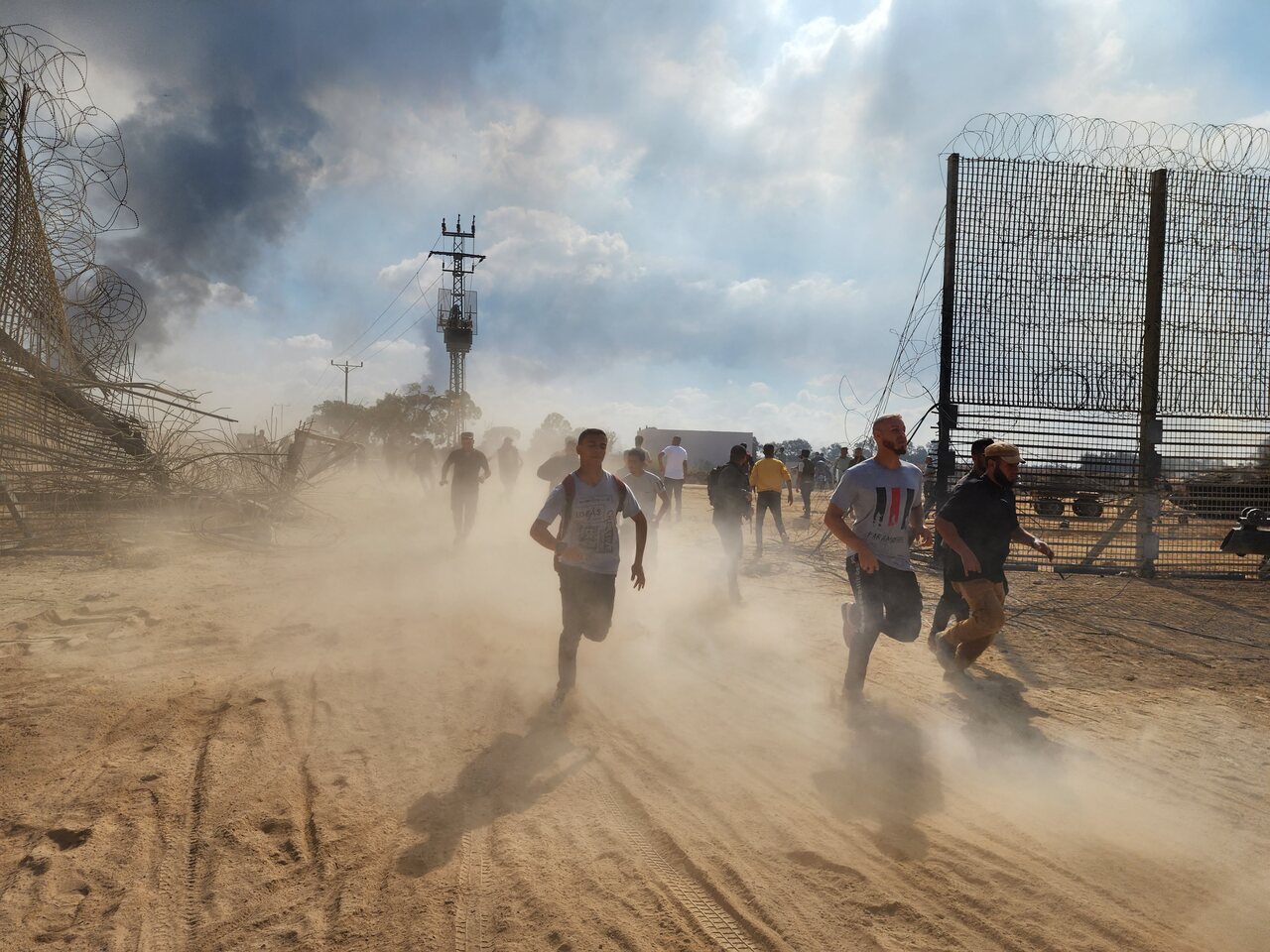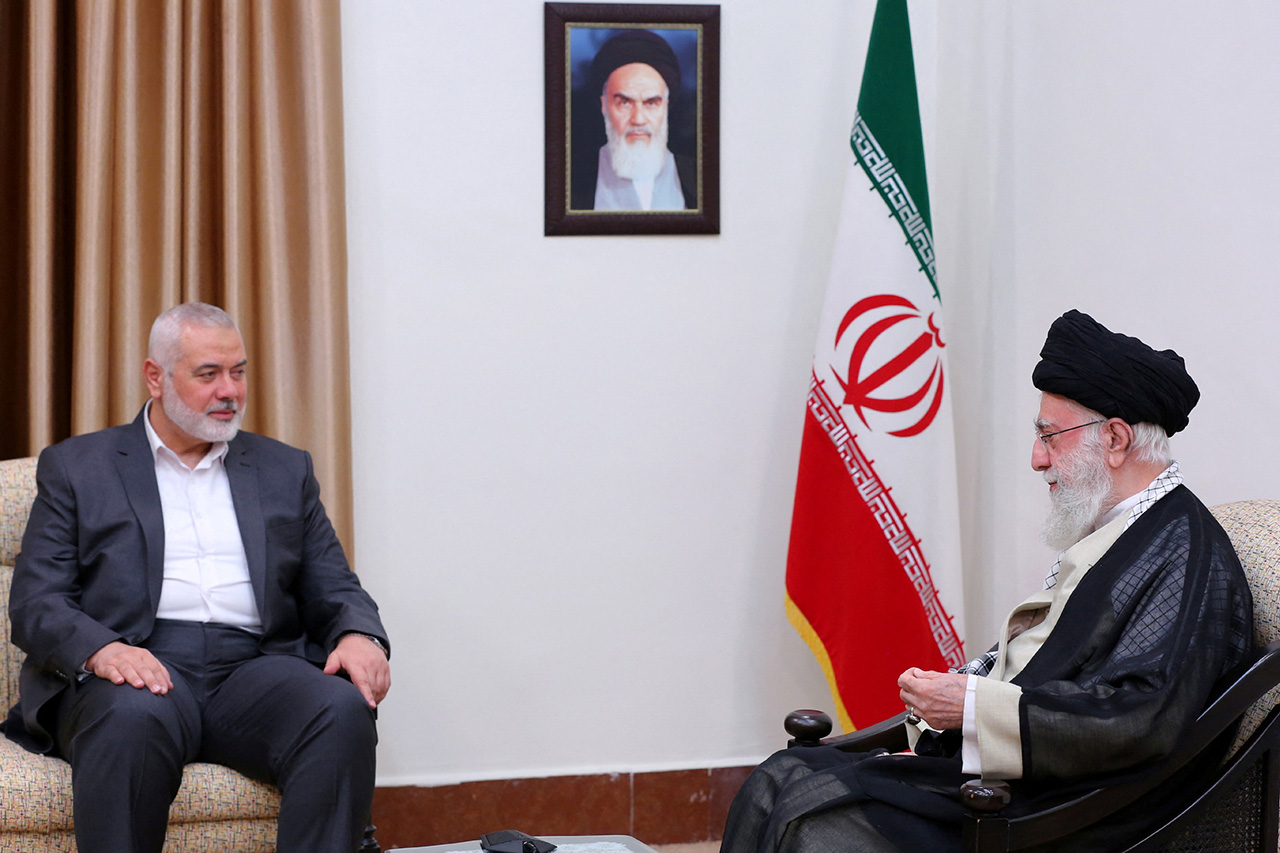War with Hamas Carries Many Political Implications for Israel
The deadly Hamas attack on 7 October ignited one of the most significant state crises since Israel’s founding. The socio-political effect seen in the formation of a unity government has stabilised Benjamin Netanyahu’s position, but only in the short term. A long-term operation to eradicate Hamas will generate high social and economic costs for Israel, while the investigation into the negligence on the part of the authorities and security forces on the day of the Hamas attack could lead to profound political changes.
 Balkis Press/ABACA / Abaca Press / Forum
Balkis Press/ABACA / Abaca Press / Forum
Israel’s Political and Military Situation before 7 October
Ever since Prime Minister Netanyahu’s return to power last December and the formation of a coalition involving religious parties and the far right in Israel, the political and social conflict in the country has escalated. The central point in the dispute has been the government’s proposed judicial and justice reform, which included trimming the powers of the Supreme Court. The plans were met with massive opposition, including regular demonstrations by tens of thousands of people (reaching 700,000 at one point), as well as protests by the business community and the military and security services (such as declarations by soldiers that they would refuse to participate in reserve drills). The situation was further aggravated by harsh and polarising political rhetoric. After some of the reforms were adopted by a constitutional amendment in September, the Supreme Court held hearings on the legitimacy of the changes. The political crisis then became a constitutional one—whether the Supreme Court could even decide whether the amendments are unconstitutional—as government politicians declared they would refuse to recognise the Supreme Court’s final verdict. Other elements of the conflict included the government blocking the convening of the Judicial Selection Committee and attempts to influence the procedure for electing the chair of the Supreme Court (the term of the current one, Esther Hayut, expired in October).
The social polarisation and political crisis have overlapped with the difficult security situation. In response to a growing number of attacks by new Palestinian groups and the inability of the Palestinian Authority (PA) services to control the situation, the Israeli army carried out a number of operations in the West Bank. According to UN data, by the end of September, about 200 Palestinians (militant and civilian casualties) and about 30 Israelis had been killed in the West Bank. In addition, since the beginning of the year, the number of assaults and acts of violence by Jewish settlers against Palestinians had been on the rise, with barely any containment by the state. As a result, Israel had more concerns about the threat of destabilisation with these areas than the relatively calm Gaza Strip since the last escalation in 2021. This perception resulted in a greater concentration of military forces in the West Bank.
Political Action
Following the 7 October Hamas attack, the Israeli authorities declared a special home-front situation in the areas around the Gaza Strip and a civil emergency event throughout the country. Israel mobilised about 360,000 reservists (4% of the population). There has been some, albeit limited, consolidation at the political level among Israeli parties, as the National Unity party entered the government coalition. Its head, Benjamin Gantz, joined the War Cabinet (responsible for military decisions) and politicians from his grouping joined the Security Cabinet as ministers without portfolio. The main opposition party, Yesh Atid, led by Jair Lapid, who conditioned his accession to the government on removing far-right politicians, eventually refused to enter the coalition. At the same time, Lapid announced his full support for the authorities in the face of the crisis. The remaining opposition parties also did not join the government. According to the inter-party coalition agreement, the Knesset is to proceed with bills exclusively concerning the current conflict, which temporarily halts, among other things, the judicial reforms.
In polls, an overwhelming number of Israeli citizens hold the current government responsible for the lack of preparedness and late response by the army and services to the Hamas terrorist operation (about 94%). In particular, the public puts the blame on Netanyahu as the leading architect of the policy towards Hamas to date. At the same time, he can still count on the support of his electorate. Only about 56% of those surveyed demand his immediate resignation. Gantz and his party, however, are emerging as the new leading grouping, but assessments of the unity government’s actions may negatively affect his image and standing.
Economic and Social Aspects
The Hamas attack and the planned intervention in Gaza are taking a toll on the Israeli economy. The primary reasons are the mobilisation of Israelis and the temporary exodus of hundreds of thousands of workers from the labour market. Further complicating matters has been the reaction of the financial markets—stock market declines, a weakening currency, and risk of ratings downgrades. Sectors such as agriculture—a significant portion of production came from the attacked areas—and tourism are heavily affected. Hamas’ actions have also forced a reduction in gas production from deposits in the Mediterranean. The authorities are trying to calm the macroeconomic situation through shield programmes and other measures.
At the social level, the Hamas attack is perceived as one of the most significant state failures in Israel’s modern history. The most frequently cited analogy is to the surprise offensive by Egypt and Syria during the Yom Kippur War in 1973 (the Hamas attack coincided with its 50th anniversary). Military actions requiring the army to retake Israeli territory last happened in 1948. Exacerbating the trauma today is the scale of casualties on the Israeli side, which exceeds the number killed during the Second Intifada of 2000-2005, as well as the brutality of the attack and the hostage-taking by Hamas (the confirmed number is about 230). This has shocked Israelis, who had a kind of stable sense of security, the provision of which is considered the paramount duty of the authorities. In response, public sentiment indicates high acquiescence to retaliation against Hamas and the people of Gaza.
The 7 October attack also triggered internal consolidation evident, among other things, in the reactions of the Orthodox population (such as volunteering to join the army) and the Arab minority. Opposition to Hamas’ actions and gestures of solidarity from the latter group reduces the chances of interethnic confrontations like those in 2021. However, the risk of radicalisation persists, primarily due to the growing number of civilian casualties in Gaza, police activity, and the constant actions of Jewish radicals in the West Bank. These factors will also affect the international perception of the Israeli actions and strengthen anti-Israeli sentiment worldwide.
Conclusions and Outlook
The 7 October attack is a historical low point for Israel. The social effect of the events will be long-lasting. The existing model for the functioning of the state may be subject to revision if public opinion sees it as ineffective in the face of the attacks. An attempt to develop a new social contract at the level of internal relations (religious-secular relations, Jewish-Arab population) or the political system (attempts to strengthen state institutions) is also plausible.
At the economic level, the war in Gaza, primarily the mobilisation of reservists, will put additional strain on Israel’s economy. The Hamas terrorist operation and subsequent actions will tarnish Israel’s image as a safe state for investment or tourism and temporarily hinder its role as a supplier of energy resources.
After the cessation of hostilities, an investigative state commission will likely be established to search for the failures that led to the attack, as was done after the Yom Kippur War or in Lebanon in 2006. On the political level, this presents a severe threat to Netanyahu’s hold on power, especially if he fails to retain the support of his party and fellow coalition partners. In early elections, the current opposition would have a good chance of victory. Still, at the same time, extreme political forces benefiting from the radicalising public sentiment may also gain from a prolonged conflict.
It should be assumed that despite the state of war and the formation of a unity government, the existing political disputes will not die down, and the ruling camp will try to shift some of the responsibility for the events of 7 October to the security apparatus. Ad hoc political objectives may thus be subordinated primarily to actions in the West Bank or inside Israel. Political and inter-institutional tensions may impinge on the strategy of military operations or aspects of them, possibly leading to greater acquiescence to losses of Israelis and Palestinian civilians in attempts to free some hostages as soon as possible.
The long-term effects on Israel’s policy towards the Palestinians will depend on the results of the confrontation with Hamas, the methods used (including the degree of destruction in the Gaza Strip, Israeli forces and Palestinian civilian losses), and the international reaction, which will affect legal matters. On the one hand, primarily the scenario of Israel defeating Hamas while having few losses, the result could be space for new political initiatives with respect to the Palestinians. On the other hand, in the face of extreme mistrust between the parties, it could mean a permanent hardening of Israel’s position and even harsher control over the Palestinian population.






